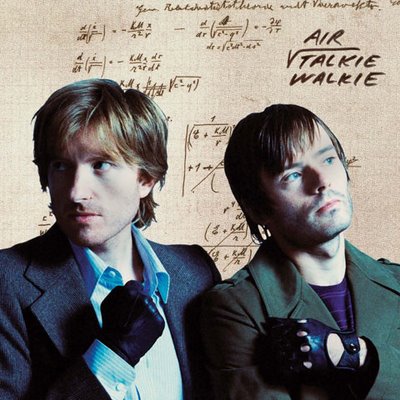

However, the keyboards taking a larger role didn't disrupt second album Cuckoo (1993) and in some ways it's a better record than Doppelganger. It's quieter, more considered and has much better melodies (the second side is really restrained and has some genuinely lovely stuff on it). There is a fairly delicate balance struck between the kind-of sinister dance beats and keyboard washes (the Nine Inch Nail-isms...) and the wall of guitar feedback and Halliday's voice sits directly between the two. In retrospect I think Curve were doing something surprisingly complicated and all the gothisms and heavy make-up maybe distracted from what they were actually up to. I like Cuckoo a lot, and although I'll get no hip points for saying so, I think Curve were, for a short time, a very good band.

Hurray for OMD! And so say loads of young bands, including Australia's Cut/Copy who use the 80's pop template to cast their new brand of electronic dance-pop. Third album Zonoscope (2011) is a fantastic bit of over-the-top, shimmeringly pristine fun and although slightly overlong at an hour, it still manages to be, for the most part, completely engaging. It's what pop music in a post-everything age should be, completely facile and dazzingly shiny, and when it's on fire, it's absolute magic. On the face of it, it's not exactly rocket science to think of blending Daft Punkish dance backing with Cyndi Lauper basslines, but when it comes off it really does sound great.

Now, not everybody likes impenetrably dour Scottish poet Ivor Cutler's harmonium/outsider poetry combo. In fact I think a lot of people find it a bit difficult, troubling even. Personally I think it's wonderful stuff, funny, moving and singularly improbable, and the fact that he made records at all, let alone so many, is a triumph of an age in which record companies weren't only after the cash but were proud to acknowledge difference. Cutler had knocked out a few bits and pieces in the preceding fifteen years by the time Dandruff was released in 1974. It set the template for the rest of his albums, consisting of 45 tracks, the majority of which are miniature poems, read out by Cutler in his gloomy, low voice. The rest are poems half-sung, half-spoken, and accompanied by Cutler playing his harmonium. Often there is scarcely a semblance of a tune, but once in a while a jarringly lovely melody appears out of nowhere and vanishes again ('An Old Oak Tree' for instance). Cutler's bizarrely acute observations of the absurdities of human psychology, behaviour and experience are either deeply penetrative or else whimsically facile, but personally I'm convinced they are the former. 1976's Jammy Smears is more of the same and is equally remarkable and idiosyncratic and has some lovely songs ('Beautiful Cosmos' is a wonderful song and Kathryn Williams covered it superbly many years later). It mixes stuff up a bit with more lively songs and some performed on piano (superb opener 'Bicarbonate of Chicken' is particularly brisk).


And that's the end of the letter C. Obviously I've bought plenty of rubbish while we've been going through this torment so I have to go back over any A-C's that I've bought. It's only two surprisingly, the first of which is Air's appallingly titled Talkie Walkie (2004). Today has actually been the first time that I've listened to it so my opinion is pretty sketchy. At first (at work) listen it seems pretty decent to me. I know everybody talked about it being a return to form and bearing in mind I've always found their form to be flexible at best, that's not tough. There are some lovely things going on ('Cherry Blossom Girl' is an unsurprising choice for a single) and there's some nonsense too (the cod classicisms of 'Mike Mills' are pretty grating for instance). On the whole though I reckon a few listens will make it a winner for me.

Pop. Music. I love pop music sometimes. It has to be the kind of pop music that either everybody cool honestly hates or everybody cool pretends to like. Everybody cool pretends to like Annie and there's good reason as far as I'm concerned - her records are bang on. This is just what pop music should be, slippery, sleek, bright but with a darkening edge - it's great stuff. And just as Anniemal was grand, so too is 2009's Don't Stop. This is all brilliant pop music, the kind of thing that Pixie Lott and Little Boots bastardised and made sloppy and second-rate. Annie is just too smart to make lazy records like that though, and Don't Stop is a monsterous slab of unforgiving pop music and it's simply ace. In some ways Don't Stop is less self-aware, less self-conscious and tricksy than Anniemal. It's the same template but it's more unashamed, more prepared to simply stand or fall as pop music. And it stands.

Just time for the first D, Dakota Suite's Signal Hill (2000). Not quite slowcore, not quite Americana, Signal Hill is a strange, gloomy, sedate affair. It's a lovely album but good lord it's a downer and not in the obvious Smog or Simon Joyner, oh boo-hoo listen to how sad I think life is kind of way (which, don't get me wrong, I love sometimes), but in such a low-key, unobtrusive kind of way that it's almost not even there. In many ways it's a testament to the skill involved, but considering that it employs a wide range of instrumentation and stylistic touches you would kind of hope that the whole thing would be more engaging, but it lingers with such icy detachment that it's a hard record to really get to love I think.

No comments:
Post a Comment